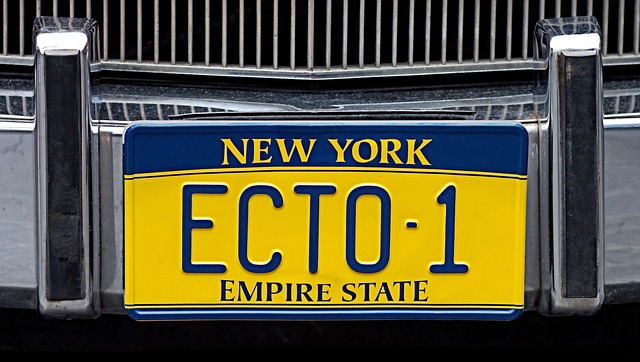Moving to a new state demands understanding and adhering to local smog check regulations, which vary by state. Research your state's DMV guidelines, consider agreements with neighboring areas for out-of-state inspections, and plan ahead to avoid registration delays. Additionally, the text explores the evolving urban mobility landscape, highlighting innovative solutions like electric scooters and shared biking systems, while emphasizing the need for thoughtful integration into existing infrastructure for safety, efficiency, and sustainability.
- Understand State-Specific Vehicle Registration Requirements
- Navigate Smog Check Mandates for Out-of-State Vehicles
- Complete Necessary Inspections and Documentation
- Learn About DMV Services for New Residents
- Explore Digital Tools for Streamlined Registration
- Stay Informed on Recent DMV Updates and Changes
Understand State-Specific Vehicle Registration Requirements

Moving to a new state means navigating a different set of rules when it comes to vehicle registration. Each state has its own unique requirements, which can vary significantly from one place to another. These regulations cover various aspects, from emissions testing and inspection to documentation and fees. Understanding these specifics is crucial for a smooth transition.
Recent updates from DMVs across the country reflect an effort to streamline the registration process for new residents. However, it’s essential not to overlook the state-mandated steps. Staying informed about local laws ensures compliance and prevents potential issues down the line, such as fines or vehicle impoundment. Therefore, do your research, reach out to your local DMV, and familiarize yourself with the requirements specific to your new state of residence.
Navigate Smog Check Mandates for Out-of-State Vehicles

Moving to a new state means getting your vehicle registered, and one of the key aspects is understanding smog check requirements. Since each state has its own regulations, especially when it comes to air quality standards, out-of-state vehicles may need to undergo specific emissions tests. These smog checks are designed to ensure that vehicles meet environmental safety standards before they can be officially registered locally.
To navigate these mandates effectively, newcomers should first research the state’s Department of Motor Vehicles (DMV) guidelines on emissions testing. Many states have agreements with neighboring areas to accept certain out-of-state inspections, making the process less cumbersome. Keep in mind that failure to meet smog check requirements can delay or even void your vehicle registration, so it’s crucial to plan ahead and comply with local environmental regulations.
Complete Necessary Inspections and Documentation

Moving to a new state means getting your vehicle registered, which involves completing necessary inspections and gathering essential documentation. Each state has its own set of requirements for vehicle registration, including emissions tests or smog checks. These tests ensure that your vehicle meets environmental standards and is safe for road use. Before heading to the DMV, familiarize yourself with these regulations specific to your new state. Gather all required documents such as proof of ownership, insurance, and identification. It’s also wise to check if you need any additional forms or certifications.
Proper preparation can make the registration process smoother. Some states allow you to schedule inspections online or provide guidance on authorized inspection stations in your area. Be sure to follow any deadlines for registration and renewal, as penalties may apply. Keeping accurate records of your vehicle’s maintenance history is helpful, as it demonstrates compliance with state regulations.
Learn About DMV Services for New Residents

Moving to a new state often means navigating unfamiliar territories, including the process of registering your vehicle. The good news is that Department of Motor Vehicles (DMVs) across the country are implementing changes to make this transition smoother for newcomers. Start by researching your state’s specific requirements and understanding what’s involved in out-of-state vehicle registration. Each state has its own set of rules, including regulations related to emissions testing, inspection, and documentation.
Many DMVs now offer online resources and guides to help residents understand the process. You can also reach out to the local DMV for personalized assistance. They can walk you through the steps, explain any recent changes, and provide information about necessary documents and fees. By being proactive and well-informed, you’ll find that transitioning your vehicle registration is a manageable part of your new state’s journey.
Explore Digital Tools for Streamlined Registration

In today’s digital era, many states offer online tools to simplify the vehicle registration process. These platforms allow you to complete necessary paperwork and even schedule inspections remotely. By exploring these digital tools, you can save time, avoid bureaucratic hurdles, and ensure a smoother transition to your new state’s registration requirements.
From initial application submissions to receiving digital notifications for follow-up actions, these online systems provide transparency and convenience. Additionally, some states have integrated mapping features that guide users through local inspection stations, making it easier to locate and visit these facilities when required.
Stay Informed on Recent DMV Updates and Changes

Moving to a new state doesn’t have to be a daunting task, especially when it comes to vehicle registration. By understanding each state’s unique requirements, navigating smog check mandates, completing necessary inspections and documentation, leveraging DMV services for new residents, exploring digital tools, and staying informed on updates, you can transition your registration smoothly and remain compliant with local laws. Remember, knowledge is power, and a little preparation can go a long way in ensuring a stress-free moving experience.



